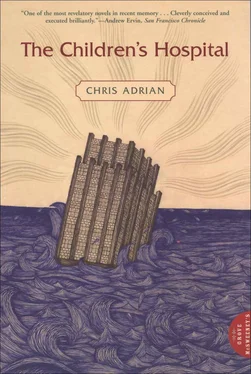“Very well, but I have listened to her dreams and I know where she wants her spangles to fall.”
“Just do it, bitch. Who’s in fucking charge here, anyway?”
“You are,” she said, and the machine sighed, and the mist spilled out on the floor. When he picked the shoe from the hollow it was still full of mist. He turned it over in his hand and the mist spilled out, falling slow and straight, splitting into a dozen rivulets and disappearing just before it reached the floor. The shoe was just as he had imagined it, and finally just as he had described it — nothing missing, nothing extra, the sole just as black as he wanted it, the velero nibs and steel spikes arranged just as they were supposed to be (they would help her stay steady on her feet and draw blood if she should have to kick some random motherfucker in the face); the sparkles were subtle but not invisible, the red tongue was flared just so, and the inside of the shoe was blaze-orange and would always have that smell (he partook of it now) that was like pressing a brand-new not-yet-kicked soccer ball against your face and breathing in through your mouth and nose both.
“Finally,” he said, and walked off, swinging the shoes by their long laces at his sides. He passed Josh and Cindy and Kidney — all too busy to talk — stopped a moment at the window to look out over the water at the sunny day, and came finally to the general medical ward, stuffed with old patients, three to a room. He passed by his patients’ rooms — he had already made his rounds and was sure that everybody had their medicine and something to look at and that if they needed anything else it could wait a few minutes for him to take care of this thing. He passed Ms. Dufresne’s room, and saw her feet sticking over the edge of the bed, wearing her sneaker-boots. He stuck his hand inside her door to wave, and she called out, “Hey, baby!”
“I’m not your baby,” he called back, in a friendly way, but put on a don’t-fuck-with-me face as he passed the nurses’ station — he didn’t want them asking him to go fetch a bag of blood or change the tubing in an IV pump right now, and they knew better than to ask him for the least little shit of a thing if the invitation was not on his face. Five more doors down the hall he came to the family conference room where Jemma was sleeping, shouldered the door open, and went in.
This was the place they used to bring families to tell them their kids were going to die. In the old days he’d hidden here, like he’d hidden everywhere else, supremely powerful in his invisibility, hearing all and knowing all, biting his knuckles under the couch while Dr. Sashay detailed for Juan’s mother all the ways in which he was fucked, the lady crying through her questions, the dry hiss of a tissue leaving the box marking time as regular as a slow-ticking clock. Jemma was sleeping on the couch now, stretched on her side, her huge belly just reaching beyond the cushions, her feet stuck up over the armrest, one clog standing beneath them and the other dangling off her toes. Before he got the shoes out he touched her belly very softly and closed his eyes. “Hey baby,” he said. It gave him a feeling, to touch her on the belly — nothing he could describe very well but it was good, though he knew it was perverted to go around touching ladies on their belly. Even if they were pregnant, it wasn’t right and he wasn’t a freak. “Sorry,” he said. She just kept sleeping.
He pushed off the clog with a finger and put on the shoes. They fit just right — they always did — big enough to go on easy and small enough to hug your foot like a hand that squeezed but didn’t tickle. He tied them hard, throwing the knot swiftly down the lace, and cursing softly at her as he did up the bows, but she still didn’t wake.
“Don’t say I never fucking did something for you,” he said, stifling a yawn, and left with her clogs. He would climb to the roof and throw them into the water.

The youngest ones fell asleep first. Former micro-preemies grew logy between feeds, and their parents thought at first that they were becoming lazy or distracted by the travails of their caretakers when they lost interest in crawling or pulling to a stand, and could not be convinced even to try to feed themselves with hand or spoon. When some of them became difficult to wake even for a bottle, people worried that the babies were depressed — who wasn’t, these days? — and the winnowed Council met in special session to review the scanty old literature on the use of antidepressants in children under a year old, but even before the first batch of doctored formula was cooked up, the earliest and most miraculous of them — Brenda — had already been asleep for twenty-four hours straight. At hour twenty-eight Anna paged Jemma and asked her to come up.
Escape was probably too strong a word for what she did. She always just walked out of jail. The angel would always open the door, and she had learned to make herself hard to touch, so when the guards tried to push her back or grab her arm, their arms grew weak, or they couldn’t quite find her or aim their guns with their shaking hands.
They threw her back into her room every day or two; she hardly held it against them any more, though it infuriated Rob, and he was always tracking down Dr. Snood to call him a motherfucker and threaten to quit. Dr. Snood only looked at him blandly, dabbing with a black gauze hanky at his nose, which was always running and often bled — it had been his only symptom for weeks, and he put it about that dedication to his job was holding the botch in him at bay. “We’ll muddle on without you,” he said to Rob, who never quit, and never slept, and never even cried anymore, though he still made a crying face, sometimes, in the dark of their room, when Jemma wished she couldn’t see him as plainly with her mind as with her eyes.
That day, number two hundred and seventeen, Jemma examined Brenda and every one of the other sleeping babies (a total of ten had been re-orphaned and returned to the crèche) walking by every fancy crib, each one unique, some designed by the crèche mothers and some by the parents, to look like airplanes or boats or spaceships, heavy sculpture or molecular models — they were supposed to reflect the incubating passions of their inhabitants. It had caused a controversy, back when they all had the time to debate such points, because people asked, who was to say what passions were incubating in those little heads, and maybe your baby didn’t want to be a pilot or a string theorist or a heterosexual, and who could say what would be art and what would be artisanship in the new world, and hadn’t it always been a sin, to tell your child what they could or couldn’t be? Three crèche seminars and two town meetings and a Council debate later, they decided that you could build whatever you liked for your baby, but that no baby would spend more than three days in any one crib. For days the babies rotated all around the room, but not anymore — it was too exhausting, all the paperwork that went with the rotations, and the infection-control issues were daunting. Anna was representative of her colleagues when she said, “I haven’t got time for that shit, now.”
Jemma was quick. She could do it just with a glimpse now, a pan-scan that lit up the whole little body from the tips of the toes to the even ends of the soft hair, but she always made it look harder than it was, in case people should think she wasn’t trying hard enough, in case people should think she’d become flippant or callow or just lazy in addition to being crazy and evil. She knew Anna didn’t think that of her, but still she peered into the crib for another minute, contemplating the fat sleeping face, and how the eyes darted behind the lids.
Читать дальше













